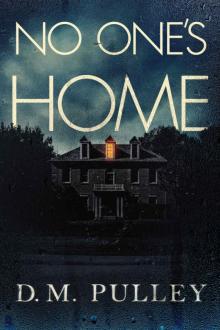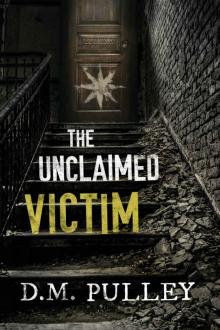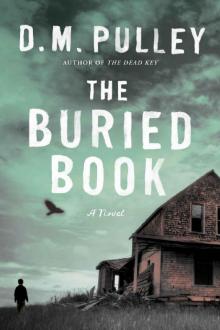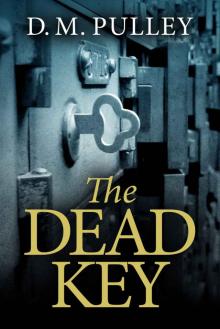- Home
- D. M. Pulley
No One's Home Page 2
No One's Home Read online
Page 2
Myron raised his eyebrows. “Haunted.”
Margot let out an uncomfortable humph.
“You might run into an elderly neighbor or two that will try to convince you that they’ve seen ghosts or that the house is ‘cursed.’” The agent made a point to roll her eyes and shake her head. “I wouldn’t pay it any mind. Several families have lived here quite happily over the years, this latest foreclosure notwithstanding, of course.”
All around them, remnants of the other families lingered—fingerprints, paint colors, nail holes, scars, stains. Margot traced their footsteps up the stairs and down the hall, settling on a far wall where someone had spray-painted words in bright red.
Murder House!
The sales agent followed her gaze. “Unfortunately, any vacant house can attract vandals, as I’m sure you understand. Even in Shaker Heights. There are many options if you’d like to have a security system installed, but I can assure you the police patrol the street regularly.”
Margot focused on the front door a moment before turning back to the grand fireplaces, the crown moldings, the built-in bookcases, the coffered ceiling in the library, the sun-filled breakfast room, the handsome butler’s pantry. Her expression softened with sympathy for the place. The house was beautiful, just horribly neglected. Lonely. Forsaken. Its broken heart resonated in the torn look on her face.
The man took a breath and asked, “So that’s it? About the haunting, I mean?”
“Essentially.” The agent nodded. “I just didn’t want you to move in and hear the rumors from someone else. The last owners who lived here fell on some hard times, as you can see, and people are always looking for something to blame. I’m sure you see it all the time in your line of work, Dr. Spielman.”
The doctor nodded. “People can be superstitious.”
“Exactly.” The woman smiled, looking relieved. They were still on the hook. “The housing crisis hit everyone in the country pretty hard, and ghosts certainly had nothing to do with that, am I right?”
Margot seemed far from convinced. A broken beer bottle lay in the corner where a radiator should have been. “What happened to the last owners exactly?”
“Oh. Poor Mrs. Martin just couldn’t manage her expenses after her husband passed away. It happens every day. You’ll find stories just like it all over Cleveland.” The agent was then quick to add, “But Shaker Heights has recovered almost one hundred percent of its home values, and we’re seeing a real seller’s market. A house like this won’t sit much longer.”
Not willing to tip his hand, the doctor offered a thin smile. “We’ll need to discuss the plans with a contractor and talk it over together before we consider any offer.”
“Yes, of course. Take a day or two, but I wouldn’t wait too long. I’m hearing from my colleagues back at the office that we have several more showings lined up later this week. Buyers out of New York.” That was a lie, but the agent sold it well.
On their way out, Margot paused at the threshold. In the center of the carved mahogany door, the face of a cherub gazed out from the bronze knocker. It had been cast to resemble a little boy. On the plate below it, a faded engraving read, Rawlingswood.
“How did he die?” she asked softly, running a finger over the name.
“Pardon?” The real estate agent’s smile fell at the corners.
“The last owner. Mr. Martin? How did he die?”
“I believe it was a heart attack. Nothing unusual, I assure you.”
Her husband gave her shoulder a squeeze. “Don’t be squeamish, Margot. Any old house will have seen its share of life and death. Isn’t that right?”
“Absolutely,” the agent agreed. “Some say it’s the history that gives an old house its charm.”
As they headed outside, the agent stopped and motioned back toward the house. “Uh, shouldn’t we . . . Didn’t you have a son with you?”
Margot sucked in air as though she’d been slapped. With all the talk of the haunting and moving, she’d lost track of him, and guilt stabbed her in the chest. Such a bad mother.
“Right. Of course.” Myron chuckled and stepped back into the foyer, shouting up the stairs, “Hunter? We’re leaving!”
The boy was standing in the middle of the bedroom with the stained mattress, facing the markings on the wall.
Natalie’s a Junkie Whore!
Even as his father bellowed from the staircase, a set of pencil markings held his attention. In a small, girlish hand, it read,
’Tis the gift to be simple, ’tis the gift to be free,
’Tis the gift to come down to where we ought to be,
And when we find ourselves in the place just right,
’Twill be in the valley of love and delight.
“Hunter!”
“Yeah,” the gangly boy answered, tearing his eyes away from the odd poem. He emerged into the long hall and loped his way down the front stairs, shoulders slumped in the put-upon manner of a sullen teenager. “I’m coming.”
The agent closed and locked the door while the family headed down the winding stone walkway. Margot stopped to look back. The white cat she’d seen earlier sauntered out from under a bush and lay down on the front doorstep. It yawned and fixed her with a preternatural stare. She shook her head at the beast and then at the mansion behind it. It was more house than they’d ever considered possible. She gazed helplessly at the sprawling brick facade as though it were an oncoming train.
Fifteen leaded glass eyes glared back through the tall trees.
Her mouth formed a few words out on the lawn while her hand pointed up at a third floor window. Both the real estate agent and the husband followed her gesture to one of the four dormers at the top of the house. A window glowed yellow against the gathering clouds. A light had been left on.
The agent smiled and waved a hand to say she’d take care of it, but that, of course, was another lie.
3
The Rawlings Family
October 26, 1929
“Welcome! Welcome to Rawlingswood, my dear friends.” Walter Rawlings opened the door with a flourish to let in the first wave of dinner guests. His mustache gleamed with wax, and his waistcoat creaked with starch.
Andrew Carnegie’s cousin Ardelia strolled in with her mincing husband in tow. She handed her mink stole to the housemaid, Ella, without so much as a glance.
The middle-aged maid stood ill at ease by the door in her black-and-white uniform and passive smile. She hated Walter’s parties. So many mahrime gaje with such terrible manners. Ardelia’s husband folded his topcoat over his arm and presented it to Ella as though it were a gift.
“So good of you to have us, Walter,” Ardelia purred. She carried herself like royalty across the polished wood floor, making a cool appraisal of the imported rug, the crystal chandelier. Pedestrian, but what can you expect from a lawyer, or whatever it is that Walter does these days? her condescending smile said. “Now where is that gorgeous creature of yours?”
“Georgina’s seeing to little Walter. Always the doting mother. She’ll be down in a moment.” Walter cleared his throat with almost imperceptible annoyance at his absent wife and motioned to the sitting room on the left of the two-story entryway. “See that James makes you a proper cocktail.”
Three more couples arrived in short order, and soon the sitting room bubbled over with mingled voices, the clink of crystal, and the jazz record Walter had put on the Electrola. Jazz, like the liquor, was one of Walter’s little social rebellions meant to lend a certain edge to the party. The conversations kept safely to golf, interior decorating, the weather, and country club board elections.
No one mentioned the state of the stock market, although the specter of the week’s losses cast a shadow over the room.
It was a full twenty minutes into the revelry before Georgina finally made her appearance. Thin to the point of brittleness, she appeared ashen against the burgundy wallpaper, a ghost of herself to those who had known her before. Before Rawlingswood. Before her
son. Her honey-blonde hair had grown thin and dull. The spark that had attracted Walter ten years earlier had dimmed beyond recognition. Georgina had been twenty-eight years old, hardly a girl, when they’d married, but she remained a small slip of a thing with the glassy blue eyes of a doll. She’d never managed to grow into the woman he’d expected.
The ladies’ eyes whispered to each other in glances behind her back. She’s getting worse, the poor thing.
“There she is!” Ardelia sang out loudly, already two cocktails into the evening. “Darling, you look like you need a drink!”
Ten minutes later, the bell rang for dinner. With the eight guests arranged about his table, Walter sat back, his hands folded over his pronounced belly, and beamed at the sight of his dining room. He’d demanded the oversize cavern from the architect with exactly this sort of evening in mind. Still, his smile held the melancholy of nostalgia, as if the evening surrounded by friends were a last supper.
“Is she even Christian?” The question came at him from the banker’s wife to his right. Georgina had just told of how their maid, Ella, had healed a scratch on little Walter’s leg with some herbs and a foreign prayer. I’m telling you, it worked like a charm.
Walter shrugged as though the religious beliefs of his housekeeper had never crossed his mind. “You know, I haven’t dared to ask.”
The woman ran an absentminded hand over her pearls. “I can’t say I’d be comfortable with her as a governess, myself. Have you ever considered hiring someone else?”
“Are you kidding?” Walter laughed. “She’d put a curse on the house! I’m pretty sure her family back in the old country were gypsies!”
This titillated his end of the table, but Georgina wilted in protest.
“No, no,” she murmured softly, shaking her head. “She’d never. Ella is wonderful. Little Walter just adores her. I really don’t know what I would—”
Something broke her thought. A sound only she could hear. She turned her head to the phantom murmur on her right. Is it a cry?
“I’m sure she’s quite lovely, darling. Besides, don’t we all need a little witchcraft from time to time?” Ardelia arched a brow wickedly, casting sly glances around the table, daring the bourgeois collection of guests to protest.
The banker’s wife ignored the quip. “Georgina? Are you alright? You look a bit peaked.”
Georgina didn’t answer. Her glassy eyes fixed on the far wall as though she could see through it to the timbers beneath the plaster. The wooden strands of the house strummed a silent tune, a song playing somewhere just beyond her reach.
“Darling?” Walter’s voice cut through the tension gathering around the table.
Georgina blinked away the fugue. “Yes?”
Just then, Ella appeared at Walter’s side and whispered, “Your guest is here.”
“Ah. Wonderful!” Walter stood up and addressed the guests. “We have an unusual treat this evening, folks!”
Georgina stiffened, a finger curl falling over her cheek. Knowing Walter, it could be anyone.
He left the dining room, a hush of intrigue roiling in his wake. Incorrigible Walter! He just loves his surprises. He returned several moments later with an elderly woman on his arm.
“Ladies and gentlemen, it is my esteemed honor to introduce Miss Ninny Boyd. She is one of the original Shakers from the North Union Settlement. She tells me she went to grammar school not far from where we are sitting right now.”
A wave of surprise and delight swept through the guests. How amazing. You don’t say? Can you imagine?
The old woman’s watery eyes scanned the painted faces of the society ladies and the boozy grins of the men until they found Georgina. “I am so sorry to have interrupted your meal. Forgive me,” she said in the quavering voice of the ancient.
Georgina dropped her fork.
“Don’t be ridiculous!” Walter said, pulling out the spare chair for her. “Waiters. Please get our honored guest something to eat.”
The hired staff went scrambling back to the kitchen. Ninny sank her small hunched frame down into the chair, not taking her eyes off Georgina, who grew paler by the moment.
Ardelia leaned in, leering as though the old woman were an animal at the zoo. “Miss Boyd, you simply must tell us everything about the Shakers!”
“There is hardly much to say.” But there was. Please forgive me, but there is much I must tell you, her eyes pleaded with her frail hostess. The proper words failed the old woman.
Georgina sat stricken, refusing to meet the woman’s urgent gaze.
One of his golf partners turned to Walter. “How on earth did you manage to meet a Shaker, old man?”
“Georgina was clever enough to meet the dear woman the other day. Isn’t that right, darling?”
Georgina’s lips had gone nearly white. She took a sip of wine to stall for time and collect herself. She cleared her throat. “Yes. I met Miss Boyd in the flower garden.”
Ardelia gaped in amusement. “In your flower garden here? Behind your house? What on earth were you doing back there, Miss Boyd?”
Ninny shifted uncomfortably in her seat. “I had not been back in this valley for so very long. I suppose I came to pay the past its due.”
“What past, darling?” Ardelia pressed.
The old woman sat there, shrinking in the light of their collective gaze. She realized with some consternation that she would have to find the words for it. Her voice, thin as thread, rose with growing doubt. “The dead do not rest so easy here, I fear.”
“The dead?” Ardelia arched an eyebrow.
An uncomfortable hush fell over the table. Georgina cocked her head at a sound no one else could hear. Only Ninny seemed to notice.
“Ha! Fascinating!” Walter said in his booming voice, slapping a loud hand on the table. Georgina jumped at the impact. “Georgina, love, why did you not tell me of Miss Boyd’s mission? I love a good ghost story! Do tell us, Miss Boyd. Can we get you any wine?”
“Oh, dear.” Ninny’s eyes fell to her lap, her dire warning reduced to a parlor game. “I couldn’t possibly.”
Walter nodded. “Of course. How foolish of me. Surely these sorts of spirits were frowned upon in the old Shaker community.”
“There was no drinking permitted? Even before the law, I mean?” the banker’s wife put in.
Ninny folded her hands in her lap in the manner she’d been taught all those years ago. “No. Mother Ann frowned on such things, I’m afraid.”
“Mother Ann?” Ardelia said with a glimmer. Peasant witchcraft, it said. “Who was she?”
“Mother Ann foretold Christ’s Second Coming . . . her divining brought the Believers to the Valley of God’s Pleasure here. They say angels whispered in her ear.” Ninny’s voice dropped to a near whisper itself. Nothing was going as she’d hoped.
“My. And do you believe this as well?” the banker’s wife asked.
Ninny’s sagging gaze settled back on Georgina’s porcelain face. “I believe God speaks to those that listen.” Please, you must listen.
“Is it true that the Shakers were opposed to marriage, Miss Boyd?” Ardelia sipped her wine, daring the old woman to discuss the lack of sex in her religion. It was common knowledge that the Shaker commune had died off largely due to celibacy.
Ninny kept her eyes on Georgina—the hostess sat stiff as a board in her seat, as though listening to whispers of her own—and then the rude question registered. Marriage. “We believed many things that were unfashionable at the time. I can’t say this other world fits my heart better.” She shook her head at the enormous crystal chandelier hanging over them. Her eyes narrowed at the ceiling as though counting the timbers hidden beneath the plaster until she’d entirely lost her train of thought. Suddenly dismayed, she frowned at her host. “Did they mill the trees here when they built the house?”
Walter looked up at this, eager to discuss the construction of his castle. “We shipped in most of the lumber, but a few of the larger beams and all the panel
ing came local. I had a carpenter select a few old-growth timbers from the land they were clearing nearby. You just couldn’t get this type of wood for a decent price, not with all the construction going on.”
A few of the dinner guests took their cue to compliment the wood carvings and grain. It’s quite lovely. Knotty oak?
Ninny nodded, contemplating the wainscoting surrounding them, then shut her eyes a moment. She swayed ever so slightly in her seat to a rhythm only she knew—a faint singing that resonated in the wooden bones of the house.
Plant the trees round, round the cathedral.
One to the north, east, south, and west.
In the Grove, I hear angels singing
Songs of the Lord and those that rest.
Georgina lifted her eyes from her plate, afflicted. “Forgive me. I think I hear Walter Junior fussing upstairs. Will you all please excuse me?”
“Don’t be ridiculous, Georgina! Ella has things well in hand,” Walter said with a warning in his voice. It wasn’t the first time she’d tried escaping a dinner party.
“I don’t hear a thing, love,” the banker’s wife said and offered her friend a sympathetic smile before turning back to the guest of honor. “So tell us, Miss Boyd, what about this place brought you back? What is this about the dead?”
The old woman’s eyes misted a moment, remembering the voices, hearing the warning bells. The heat of a long-forgotten fire burned in the back of her mind, mingling with the sounds of men on horseback and women and children screaming. We are not armed! Please! Let us be! There are children here!
Georgina lurched out of her chair. “I really must go check on little Walter. I won’t be a moment.” She slipped out of the dining room before her husband could protest.
“Please forgive my wife, everyone.” Walter’s face reddened with his irritation. “She’s been a bit out of sorts these past few weeks.”
“Can you blame her? After what the papers have been saying?” the long-silent doctor’s wife blurted out, and the unspoken contract between them all was broken. The papers. The market. She glanced furtively around the room, seeking forgiveness for her faux pas.

 No One's Home
No One's Home The Unclaimed Victim
The Unclaimed Victim The Buried Book
The Buried Book The Dead Key
The Dead Key